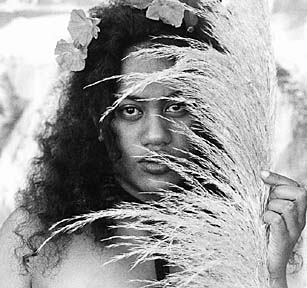


|
It's a familiar story, similar in places to "Once Were Warriors," but told in fresh and effective style by playwright- actress Dianna Fuemana in the one-woman show "Mapaki," the latest entry in Tim Bostock's ongoing program of "Pacific Island Theatre" at Marks Garage. Pacific blues
'Mapaki's tale of abuse rings true
By John Berger
jberger@starbulletin.com"Mapaki" is the story of Fisi, a young woman of Maori and Niuean ancestry whose parents hanai her to her Niuean grandmother. Fisi's "nan" raises her on a diet of kindness, good advice and soap operas. Their favorite show is "The Young and the Restless." Nan likes Mrs. Chancellor and hates Jill; Fisi finds her ideal dream man in suave and handsome Victor Neuman. Victor becomes her comfort and her confidant in times of stress.
Neither Nan nor Victor can protect Fisi once she falls in love with Jason, the young man she eventually marries. Fisi can't believe that such a handsome guy would choose -- no, has chosen! -- her when he could have his pick of so many other girls more svelte and beautiful. Jason hesitantly invites her to his home. He invites her "for a walk in the bushes." He becomes her "first and only," and Fisi falls in love with the manipulative control freak.
He doesn't want her to ever show up at the pub where he talks sports and drinks with his mates. He tells her she wears her jeans too tight. He accuses her of secretly fancying his mates. Jason would probably be insanely jealous of her imaginary encounters with Victor as well.
In short, Fisi's handsome and virile husband is an abusive spouse whose periodic bouts of remorse don't go deep enough to make him change.
Playwright Fuemana and director Hori Ahipene tell the story in vivid dramatic snapshots. Each is neatly detailed. None takes longer than necessary. The four central characters -- Fisi, Jason, Victor and Fisi's bizarre girlfriend -- are neatly defined. Ahipene uses different colors of stage lighting to further differentiate them. Changes in lighting also indicate Fisi's emotional condition as she disintegrates.
Where: The ARTS at Mark's Garage, 1159 Nuuanu Ave. 'Mapaki'
When: 8 p.m. today through Sunday
Tickets: $15
Call: 528-0506
Fuemana's portrayal of the increasingly malevolent Jason is masterful, while Gina, the girlfriend, is played as a bizarre, over-the-top drag queen-like character, offering comic relief, perhaps, in an otherwise grim story.
Fuemana and Ahipene opt for subtlety elsewhere. Changes in the characters' relationships are often indicated with a single gesture or bit of dialogue. Others are suggested enigmatically and left for the audience to interpret. Without reference to program notes, it's sometimes difficult to determine whether Fisi is talking to herself or having an imaginary conversation with her grandmother.
Fuemana refrains from going so deeply into the subject of abusive relationships that she reveals more about Jason than Fisi would be likely to know. (For instance: Most abusers grow up in families or cultures in which such behavior is considered a normal part of male-female relationships. Few abusers ever make good on their remorseful promises that "it won't happen again.")
Fuemana and Ahipene also deserve credit for making "Mapaki" no longer than it needs to be to tell the story and bring it full circle. With luck, "Mapaki" will inspire new Pacific playwrights here to bring their stories to the stage.
Click for online
calendars and events.